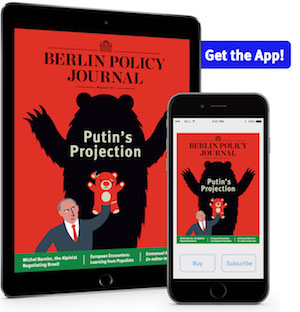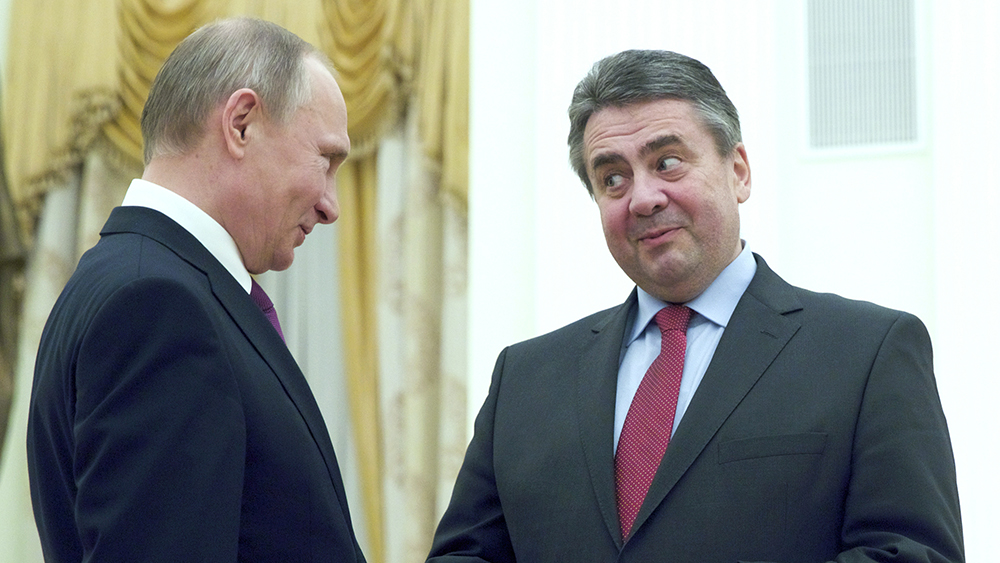Even as the Kremlin annexed Crimea, a number of Germans still showed sympathy for Russia. Social Democrat KARSTEN VOIGT, an elder statesman of German foreign policy, explains.
Mr. Voigt, is Germany’s view of Russia special? Well, every relationship between one nation and another is special; many countries claim to have a special relationship with the United States, the British do and so do we. Naturally, in light of our history, we do have a special relationship with Russia – but so do others, including the Poles. They have a very negative one! In the Russian mind, the German-Russian relationship has always been important but not always negative. At the Congress of Vienna – or later the Congress of Berlin – Russia, the Habsburg monarchy, Britain, France, and Prussia were all part of a concert of European powers. Some want to return to this constellation. I’ve had Russian counterparts tell me that we need to revive this concept of a concert of big powers – a kind of a new Yalta conference, but this time with Germany, not about Germany. This is the exact opposite of what most German politicians think. It would also be unacceptable to the German public and run counter to our national interests. In our relationship with Russia in particular, we have to consider the interests of our neighbors in Eastern Europe, especially if they are part of NATO and the EU. Our allegiance to them and the EU is fundamental.
The Kremlin seems to be trying to drive wedges between EU member countries. I first visited Russia in the 1970s, and there’s always been a misunderstanding about the substance and character of European integration. But this is not a problem exclusive to Russia – the US president is also struggling with it.
But within your own party, the Social Democrats (SPD), there has been an ongoing debate about taking a softer tone with Moscow. Nostalgia for Ostpolitik seems to play a role, often seen as the good times … You have to remember that the “good times” started at a very low point – after the building of the Berlin Wall. There was a need for change. And that’s how the SPD started its détente strategy, with the assumption that the character of the Cold War could change over time. The SPD has always believed in a policy of cooperation and dialogue – something that has often been misunderstood as being too soft. That is a misreading of détente policy. Today the SPD leadership is very realistic about how Moscow’s policy has changed. Be it for internal or external reasons, Russia no longer wants to develop a Western-style democracy, and Moscow’s behavior toward Ukraine was totally unacceptable. The SPD therefore supported sanctions. Beyond that, we have to realistically assume that Russian policy has taken a negative turn over a long period of time, so it might take years before its policy takes a turn for the better again. That means in the foreseeable future, we have to test whether there are areas for useful cooperation in spite of these negative trends.
The annexation of Crimea did indeed spark internal discussions in the SPD, for example with Egon Bahr, the architect of Ostpolitik who died in 2015. But because of the changes in Russia’s policy, I myself – like former Foreign Minister Frank-Walter Steinmeier and MP Gernot Erler, the government’s coordinator for relations with Russia – adjusted my position on Moscow accordingly.
Generally, those who sympathize with Russian President Vladimir Putin and his policies are often members of the older generation. Some are Social Democrats, but there are also people like Horst Teltschik, foreign policy adviser to former Chancellor Helmut Kohl, and others from Angela Merkel’s CDU/CSU party. For them, “east of us” is still dominated by the memory of the Soviet Union. Today, Russia is still a major player east of the EU and NATO. But it is not more important than our relationships inside the EU and NATO, including ties with our smaller and medium-sized eastern neighbors. The younger generations have grown up with independent Baltic states and Ukraine. The older generation has difficulties grappling with the changed geopolitical situation. For the young, it is unthinkable to support someone who rules in an authoritarian way or who cracks down on homosexuality. Therefore they wouldn’t trust Putin.
Do you think it’s problematic that Putin’s Russia is often seen as a normal country, when in fact it is a kleptocratic system? We also find that in a lot of other countries. In Ukraine, political oligarchs are even more numerous than in Russia, so the problem is not unique to Russia. Regrettably, you find it in Romania and Bulgaria as well, both members of the EU.
You mean we have to live with it? No, we stand for our values. These values and principles were formulated in the Paris Charter, which the Soviet Union signed. Russia has not withdrawn its signature – but it is violating the agreement. That doesn’t mean that the values of the Paris Charter are rendered invalid! They are still valid, but we cannot change Russia from outside; we can only help when it wants to change. The same is true for Ukraine.
The Kremlin thinks it can make a difference in Western elections … Yes but that’s actually nothing new, either. When I was leader of the SPD youth wing in the 1970s, there were constant attempts to influence certain elements within our party. Today those attempts have taken on a different character. Moscow is no longer defending Marxism-Leninism, and the ideological component has become less important. It has changed but not disappeared. The geostrategic conditions are very different now. The SPD leadership knows that very well.
How powerful is Russia today? On one side it is the most powerful nuclear state, together with the US. Russia’s sheer size gives it a lot of weight not only in Europe but also in large parts of Asia and the Middle East. In that sense, it’s a world power. In other areas, though, it is a regional power, and economically, it is limited. The Russians are looking to regain their old status and that shouldn’t come as a surprise. But to be strong militarily and weak economically is in the long run not a stable foundation for a country aspiring to be a world power. Obviously, Putin thinks that he can separate technical modernization from societal modernization, but that is not likely to work. I deeply regret that Russia is stagnating; its society is deadlocked, even though they think they’re moving forward. This is bad for Russia and also for us. Russia is the biggest potential challenge and partner east of the EU, while for the US, China is the biggest challenge and partner. What many Russians have interpreted as America’s deliberate attempts to limit Moscow’s influence were in reality a lack of interest in Russia.
Moscow certainly has made some waves in the US of late. Yes, they have regained the attention of the US, but in a negative context. Whether the presidency of Donald Trump is a success for them, well, I have my doubts.
Read more in the Berlin Policy Journal App – May/June 2017 issue.








